“Historians might as well throw away their pens and become movie directors. For, providing the miles and miles of celluloid are saved for posterity, the boys and girls of 2032 will need no history books to acquaint them with the doings of this silly age.” — Kaspar Monahan, Pittsburgh Press, August 1932
Sarcasm noted, Mr. Monahan, and I’ll do my best to help. Monahan is referring to release of two 1932 films, both obscure today, neither ever having been released to home video, but both surviving well enough to be scheduled every so often on Turner Classic Movies. (By the way, kudos to Monahan for forecasting the existence of classic film in a century’s time!)
The movies are MGM’s Unashamed, a July 1932 release, and Two Against the World from Warner Bros., which followed that September. I wouldn’t be surprised if you haven’t seen either movie, but maybe you’ve bumped into them at some point like I did. I recorded both from TCM, but had never previously connected the two movies, despite both being courtroom melodramas. Both are competent entries from the era, neither especially good, nor especially bad. Of course, if you’re a fan of movies from this era, then each of these do have unique little flourishes to be appreciated and possibly even draw us back for repeated viewings.
To put some faces to the movies, Unashamed stars Helen Twelvetrees with Robert Young as her overly adoring brother, who finds himself on trial for the murder of Helen’s lover, played by Monroe Owsley. Two Against the World stars Constance Bennett, who takes the blame for her sister’s (Helen Vinson) affair, and does her best to cover-up her brother’s (Allen Vincent) murder of her sister’s lover (Gavin Gordon). Bennett’s love interest is played by Neil Hamilton, an attorney who’s charged with getting to the bottom of the crime.
I’d seen each of these movies a few times, and I’d always assumed they were both just programmers cranked out by their studios to put product in theaters. It wasn’t until recently digging into the background of these movies that I discovered they were linked in their basis from a sensational society murder that occurred in November 1931.
 Details to follow, but in a nutshell, Eddie Allen killed his little sister’s lover, Francis Donaldson III. Sister Rose was just eighteen, but shocked the nation when she stood by her man and spoke out against her brother. There was more to this “honor slaying” than the “unwritten law,” but that’s the basic situation that each movie ran with. Knowing the details of the real-life murder and resulting trial behind them make each movie more notable. They’ve become little slices of forgotten history, obscurities worth remembering better.
Details to follow, but in a nutshell, Eddie Allen killed his little sister’s lover, Francis Donaldson III. Sister Rose was just eighteen, but shocked the nation when she stood by her man and spoke out against her brother. There was more to this “honor slaying” than the “unwritten law,” but that’s the basic situation that each movie ran with. Knowing the details of the real-life murder and resulting trial behind them make each movie more notable. They’ve become little slices of forgotten history, obscurities worth remembering better.
Two Against the World is the neater overall package, a tighter film because it was willing to take more liberties with fact to spin a standard movie romance around the crime itself. In this case the Allen honor slaying is more inspiration than basis. Unashamed, on the other hand, is a bit of a hot mess when you’re not aware of the Allen case looming in the background.

Above: Neil Hamilton and Constance Bennett in Two Against the World. A delightful romance grows over a couple of bowls of beans. They both even love ketchup!
The lover is a far more interesting character in Unashamed, and the movie takes a bit of a hit when the character is rubbed out. The brother-sister relationship is a strange one, almost seeming incestuous, and if you ever saw the film and wondered about this, no, they found such a portrayal strange back then too. One review referred to a “quite unnatural ardor” (Parry), while another compared the brother and sister to Romeo and Juliet, adding, “Such embraces, such lingering lip-to-lip kisses are unheard of in real life except, perhaps, among morbid misfits” (Lusk). So MGM misfired in its attempt to dramatize loving siblings, coming closer to sibling lovers. Unashamed pulls itself back together at the trial, where the sister comes to her brother’s rescue at the last moment by spinning her testimony in a very original way. This climax is well done and well acted, and it makes the movie worthwhile. In any case, Unashamed stuck somewhat close to the source material from the papers, and such rigid adherence made for a sloppier story than Two Against the World.
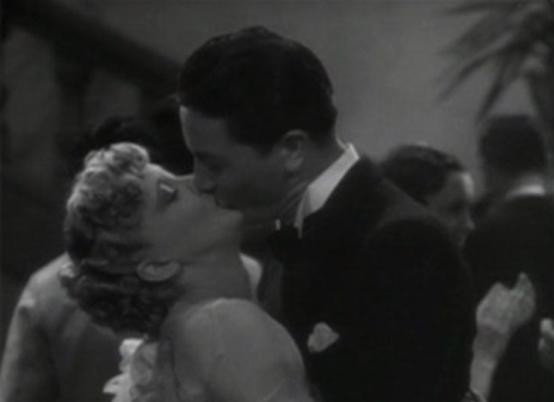
Above: It seems like another delightful romance in Unashamed, until realizing Helen Twelvetrees and Robert Young are cast as brother and sister. Did anybody tell them?
The Allen honor slaying spread across the nationwide dailies beginning in November 1931. Public interest was piqued by the less than ordinary circumstances surrounding the case as well as the elite standing of two families listed in the social register at a time when many were just scraping by during some of the Great Depression’s lowest moments.
Society Murder
About four years earlier Horace Allen, a successful wool manufacturer, moved his family to Shadow Wood, a large home in Haverford, near Philadelphia. Then the Crash came and Allen’s business quickly hit the skids. While the 1930 census still credits them with having a butler, cook, and maid on the premises, Horace’s business soon disappeared and the Allens fell so low, so fast, that wealthy friends had to fund daughter Rose’s society debut in October 1930.
By all accounts, young Rose was a sweet, quiet girl, but shortly after her coming out, around the time she met Francis “Skinny” Donaldson III, she morphed into what was described in kindest terms as a “gay flapper.” The Allens didn’t care for Donaldson, a braggart who was considered an adventurer and terrible influence on their daughter. The distaste ran so deep that Rose’s mother issued a death bed plea to Horace to keep their daughter from ever marrying “Skinny” Donaldson. Mrs. Allen died in April 1931.
Trouble with Donaldson began boiling over that Summer. In August, Rose and Donaldson had told Horace they were going to spend a weekend with some friends in New Jersey before visiting her brother, the Allen middle child, William, in Virginia. Rose arrived at William’s three days late, and when William doubted her story in Donaldson’s presence, the amateur boxer hit Allen so hard that he knocked out two of William’s teeth.When Horace’s daughter returned to their rooms at the Green Hills Farms Hotel, just outside of Philadelphia, he told her that he had called her friends in New Jersey and knew Rose was lying about where she’d been. That’s when Rose, just 17 at the time, confessed that Donaldson had taken her to a hotel in Scranton and seduced her. For the sake of propriety, Horace Allen later referred to the seduction as Donaldson’s “betrayal” of his daughter.
Horace, fearing scandal, reached an agreement with Rose. She’d be allowed to see Donaldson a couple of times per week, provided he have her home by midnight.
One evening Horace noticed the light burning in Rose’s room some time after 2 a.m. Because of the rules they had agreed to, he was shocked to open the door and discover Donaldson sitting on Rose’s bed with his daughter. He ordered Donaldson out of the room. A scene developed and Rose wound up slapping her father across the face.
When Rose’s oldest brother, Eddie, returned home after the weekend and heard what had happened, he and his sister argued over Donaldson and the poor treatment of their father. Rose later claimed that Eddie threatened, “If Donaldson comes up here to this apartment, I’ll blow his head off.” The argument escalated from there. Eddie told Rose that he wouldn’t stand for such behavior in their house, and when her father sided with Eddie she stormed out of the house to join Donaldson and a friend, Albert Lucas, at Lucas’s hotel room in Philadelphia.Donaldson and Lucas told Rose to sit tight and headed to the Allen home for a word with Horace Allen. Horace claimed that the two men were “swearing and cursing” at he and Eddie from the moment they entered, and that he ordered them out of the house, but they refused to go.
According to Edward Allen’s counsel, when Eddie reached for the phone Donaldson punched him in the jaw and then beat him some more while he was down. Meanwhile, Lucas pinned Horace Allen’s arms behind his back and began striking him with his knee. Eddie broke free from Donaldson and ran to the phone. Eddie called for help from downstairs, but the bellboys couldn’t convince Donaldson and Lucas to leave either. Eddie reached for the phone again, planning to call the hotel’s proprietor, but as he stood holding the receiver, Donaldson hit him in the face two more times. It was then that Eddie stormed off, driving several miles to retrieve a shotgun he had left at a friend’s house. When he returned Donaldson and Lucas were still arguing with his father.
From a distance of twelve feet, Eddie shot Donaldson in the chest. Donaldson died fifteen minutes later, just after arriving at the hospital.
Back at the hotel, Rose wondered what was taking Donaldson so long. She phoned the Allen home the next morning to find out what had happened, but the police answered her call and said her father and brother were at the police station.
“It is undoubtedly first degree murder,” said police Captain Mullin, a couple of days after the fact.
Movie Murders
In Unashamed, Joan Ogden (Helen Twelvetrees) and Harry Swift (Monroe Owsley) falsely register in a hotel as husband and wife, with Harry’s assurances that they will eventually be married. The following morning Swift is quite proud to tell Joan’s father (Robert Warwick) what the two had been up to the night before. It’s been made clear to the audience that Harry’s intentions are entirely dishonorable, he’s chasing Joan because she’s worth three million dollars, but Mr. Ogden intends to disinherit her if she marries Harry.
Just when Harry changes his tone and begins to get nasty about the possible repercussions of Ogden holding back his money, young Dick Ogden (Robert Young), Joan’s brother, three years her junior, bursts into the room. (Note: In the actual case, Rose was youngest of the Allen brood.) Dick’s hair is a mess and his limbs hang limp from a body absolutely emptied of energy. He’s been out all night looking for Joan and is very relieved to find her safe. Then Dick spots Harry and begins to rage. When Dick lunges towards Harry, Harry punches him, sending Dick flying to the floor. Harry even begins to turn on Joan at this point, declaring his plans to reveal their evening together to whoever will listen. Dick runs out of the room, only to return a few minutes with a shotgun. He shoots Harry dead, proclaiming, “Tell them that too, tell them that!”
The situation is more complicated in Two Against the World. Corinne Walton (Helen Vinson) is having an affair with Vic Linley (Gavin Gordon), who would really prefer to be romancing Corinne’s sister, Dell (Constance Bennett). After a night on the town, a small group returns to Vic’s apartment, where Corinne’s brother, Bob Hamilton (Allen Vincent), discovers a compact with the Hamilton family crest on a pillow in Vic’s bedroom. Dell realizes what’s happened and claims blame for the indiscretion to keep Corinne’s husband (Alan Mowbray) from discovering his wife’s infidelity.

Above: Brother Bob (Allen Vincent, at left) argues with sister Dell (Constance Bennett, right) over a compact found in Vic Linley’s (Gavin Gordon, center) bedroom in Two Against the World.
That she does, but brother Bob is fuming. He knows Vic’s reputation and can’t believe Dell would disgrace herself by having an affair with him. When Dell confesses that she despises Vic, Bob can take no more. He storms from their home intending to have a showdown with Vic, who he finds outside of his hotel awaiting a cab. Dell chases after Bob, hoping to calm him down, but by the time she reaches the hotel the doorman informs her that the men have already gone up to Vic’s apartment. While the doorman exits to send Vic’s cab on its way, Dell calls for the elevator up to his apartment. A gunshot rings out just as the elevator arrives. The elevator doors open to reveal brother Bob standing over Vic’s body with the smoking gun in his hand.
“Sis. Sis, I’ve done it. I’ve done it!”
The Allen Trial
The incident was front page news nationwide, with interest only growing after Rose denounced her brother and father. “My father and my brother are responsible for this,” she told the police in her statement. Rose added: “I will not stand by my brother. I have made up my mind on my attitude toward my father and my brother, but I don’t care to discuss that.” The public was stunned and Rose was cast the villain.
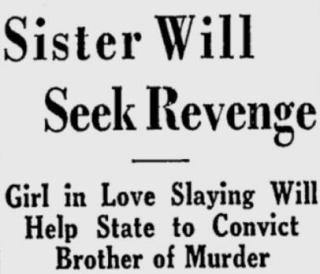 Several days later Rose did visit Eddie in jail, explaining, “I am here because I love my brother.” But in the time between Eddie’s incarceration and his February 1932 trial, the press took every opportunity it could to paint Rose as an unpredictable wild card. While she visited Eddie a few more times, she refused to pose for photos and remained distant from her father, angry because he had publicized her “betrayal” for the sake of Eddie’s defense.
Several days later Rose did visit Eddie in jail, explaining, “I am here because I love my brother.” But in the time between Eddie’s incarceration and his February 1932 trial, the press took every opportunity it could to paint Rose as an unpredictable wild card. While she visited Eddie a few more times, she refused to pose for photos and remained distant from her father, angry because he had publicized her “betrayal” for the sake of Eddie’s defense.
The public threw all of their sympathy behind Eddie and father Horace, who had become quite ill by this time, and were outraged by Rose, who was considered disloyal. “I didn’t mean to kill him,” Eddie swore on the stand, saying he only intended to menace Donaldson with the shotgun, not to actually shoot him. Allen’s chief attorney asserted, “It is the right of any individual in defense of his life to take the defense methods necessary for that purpose.”
While the papers continuously referred to the case as an “honor killing,” the jury of ten men and two women were swayed by the self-defense argument. The jury met for ten hours, but about a half hour before delivering their verdict, they asked the court for guidelines regarding justifiable homicide in the case of self-defense. The court explained that if Allen, “believed himself in danger of great bodily harm, then he was justified.” The judge added several qualifying points, but ultimately stressed that because the defendant was in his own home, he had no duty to retreat.
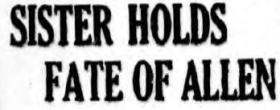 Eddie smoked one cigarette after another as he awaited the decision with his attorneys alongside him in a small room. His father and sister were confined behind separate doors, keeping themselves out of view of the crowd. When each was called back to the court, there was applause for Eddie and hisses for Rose, who stared down at the floor as she entered the court.
Eddie smoked one cigarette after another as he awaited the decision with his attorneys alongside him in a small room. His father and sister were confined behind separate doors, keeping themselves out of view of the crowd. When each was called back to the court, there was applause for Eddie and hisses for Rose, who stared down at the floor as she entered the court.
The crowd erupted at the verdict of not guilty, creating such a commotion that the judge rooted out the man who instigated the applause and had him arrested on charges of contempt.
Movie Trials
Even though self-defense is the official reason behind Eddie Allen’s freedom, it was the unwritten law and all of those “honor slaying” headlines that kept up the public fascination. Self-defense isn’t even mentioned in the movies.
The trial is what sets Unashamed back on its proper path and turns it into my preferred version of the two movies. A lot of this has to do with the District Attorney, played by John Miljan, who earned a lot of critical praise for his brief role. Much of that had to do with the long addendum tacked onto his brief opening statement after Joan Ogden (Twelvetrees) commands the attention of the courtroom with a late arrival that sets the crowd murmuring.
Joan still refuses to reconcile with her brother, but has agreed with the pleas of her father (Warwick) and his defense attorney (Lewis Stone), an old friend of the family, to at least show up in court and sit next to Dick (Young).
The DA sniffs his opponent’s possible play, and rises to continue his remarks:
“There’s no such thing as the unwritten law. Remember that, gentleman, all through this trial. There’s no such thing as the unwritten law.”
He explains, and for greater appreciation of Miljan’s performance, here’s just a portion of his impassioned speech:
Our laws are made for us by people of our own selection, our legislators. And they’re made effective by the signature of the Governor of the state. Nowhere do we find legislators saying, this is the law, but we won’t bother to write it down or annoy the governor by asking him to validate or make it effective. That, gentleman, does not happen. If we want a law to be a law, we make it so. In other trials for murder men have set up a defense that crazed by grief, or disappointment, or surprise, they killed a man. And sometimes they got away with the plea. Once in awhile, but not as often as they used to.
He goes on to describe how they’re even more liberal in this regard in other countries. Eventually we’re shown an impassive Joan Ogden when the DA turns his remarks to her:
Perhaps they will say that this boy killed a man in defense of his sister’s honor. Well, gentleman. Look at his sister. She’s not a trembling little schoolgirl. She’s three years older than he is. She’s a woman, used to society, a woman of fine social position. Gentleman, she is a woman capable of taking care of her own honor. If she wants to take care of it. I ask you to look at her as she sits there. Calm, cool, contained, ready for any emergency which might come up in this trial. Is there one of you who can say, a man’s life must be taken to defend her? Her honor is her own, and the shortest word in the English language will protect any woman’s honor, and that word is no.
He then finishes up his remarks with several winks to the all-male jury about the kind of trouble any of them could get into if the unwritten law was a valid defense.
During this lengthy speech Miljan’s body language is full of sweeping gestures and his tone alters between forceful and a winking lilt, that makes light of some of the more ridiculous possibilities an unwritten law might present. When he’s through the defense attorney finally objects. Miljan’s DA is happy to have almost all of his comments stricken from the record, advising the jury to remember just one thing: “There is no such thing as the unwritten law.”
The prosecutor in Two Against the World is not nearly as effective because that man, Dave Norton (Neil Hamilton), is also in love with the mystery woman that he’s charged with questioning, Dell Hamilton (Bennett).
The first swirls of publicity around the Linley murder were mostly concerned with the “mystery woman” who the doorman spoke to just prior to the killing. By the time the doorman returned from sending Vic’s taxi on its way, both Dell and Bob had left the scene and all that remained was Vic Linley’s corpse.
After Dell is identified as the mystery woman, Bob turns himself over to the police, but the public suspects he has done so to shield his sister. The big moment in the trial comes when Dave Norton calls Dell to the stand. Dell insists that she just happened to stop by Linley’s on the day of the murder to get out of the rain. Norton finally asks:
“Then you ask us to believe that your visit had nothing to do with his murder? Either as an event leading up to it, or in any connection with the death itself. In other words, your visit was sheer coincidence. You ask us to believe that, is that it?”
“Yes,” says Dell. “I ask you to believe that.”
There’s a hush over the courtroom. Eyes go wide, and a persistent reporter (Roscoe Karns), who’s helped turn the case into such a circus, can barely contain himself. Norton’s pause is long to the point of being uncomfortable. Then:
“The prosecution rests. No further questions, your honor.”
The crowd explodes. An anarchist jumps to his feet, waving his fist and crying, “Justice!” The reporter yells into the phone, “Norton threw the case,” adding, “It’s a frame-up. Ruin him if you can, plaster it all over the front page.”
Dell steps slowly from the stand, seeming to realize the sacrifice David has made on her behalf, though not willing to do anything about it. Before she can reach her seat, the jury foreman rises and asks if it’d be all right for him to ask her a few questions. In the end, Dell takes the blame for her sister’s affair with Linley, but admits what she saw her brother do. While there are still some romantic complications to be ironed out between Dell and Norton, the unwritten law swoops in to save her brother’s neck.
Unashamed was much more creative with its trial, adding it’s own spin to the actual Allen case. The defense attorney (Stone) finally gets Joan (Twelvetrees) to see how her behavior is going to cost her brother his life. Suddenly, she’s willing to do anything to free him. Taking the stand the next day, Joan doesn’t alter what she’s been saying all along, but she purposely makes herself look selfish, ignorant, and wholly unashamed of her actions. She does such a good job of turning the court against her, and for her brother, that as she walks out of the courtroom among the buzzing and the hisses, a bailiff tells her, “If you were mine, I’d kill you.”
Each movie ends happily. Neil Hamilton rescues Connie Bennett from an escape voyage so they can happily fade out sharing another plate of beans, and Helen Twelvetrees is back in the arms of her father, and, most especially, her brother. The scoundrel is not missed by anyone anymore, in either movie.
Postscript
After the not guilty verdict, Edward Allen was taken to a room in the courthouse, where his sister was soon shown in. She ran to him and they embraced.“Oh, Eddie,” said Rose.
“Oh, sister,” said Eddie.
The day after Eddie Allen was free, the family made news again when he and Rose were spotted out shopping together.
Eddie told the press, “Our reconciliation is going to last and all of us are going to be happy.” He added that their father was back at the apartment and the three of them even ate dinner together the night before. Despite Eddie’s optimism, Rose continued to hold a grudge against her father, who she could not forgive for exposing her private affairs. The following day she emerged from her lawyer’s office with a prepared statement declaring her everlasting love for Francis Donaldson III.
By the time of the trial the Allens were removed from the Pennsylvania social register. The Donaldsons remained listed, the only change being the addition of a date of death next to Francis III’s name.
On July 25, 1933, Horace Allen, who had been ill from the time his family first came into the public eye, died following a severe heart attack. Sons Edward and William—and daughter Rose—were at Horace’s bedside when he passed on.
Horace’s oldest child, Edward Allen, died February 4, 1937 in West Palm Beach as the result of injuries he suffered during what was either a race car accident, or, more likely given his past experience, a steeplechase accident.
 William Allen, the middle child, was in and out of jail over the next several years on drunk driving charges, and he never seemed to pull himself together. In September 1939 he was found sprawled out in his pajamas, dead on a Key West beach. The coroner’s report ruled the cause of William’s death, “heart disease, aided by drowning.”
William Allen, the middle child, was in and out of jail over the next several years on drunk driving charges, and he never seemed to pull himself together. In September 1939 he was found sprawled out in his pajamas, dead on a Key West beach. The coroner’s report ruled the cause of William’s death, “heart disease, aided by drowning.”
Rose Allen was engaged at the time of her father’s death and eventually married twice. She had one child by her first marriage, which ended in divorce, and two additional children by her second husband. It was one of her young sons by this second marriage who dialed the operator:
“I can’t get mommy awake.”
Rose Allen’s body was found with a bottle of sleeping pills nearby, causing immediate speculation of suicide. But Rose had been ill and had been taking other prescribed medications at the time of her death. The coroner discovered less than the normal dose of sleeping pills in her system, but combined with her condition and possibly other medications, it was enough. He ruled that Rose died of accidental causes.
It was March 1945, and all of the parties involved with the 1931 honor slaying were now gone. Rose Allen was 34 years old.
References
- “Allen, Alleged Killer, Visited By Sister.” Schenectady Gazette 17 Nov. 1931: 6.
- Blitzstein, Madelin. “Philadelphia’s Honor Murder.” Delmarva Star 17 Jan. 1932,: 24.
- “Final Tragedy of the Unlucky Allens.” American Weekly 10 Jun. 1945: 15.
- “Girl Wronged by Donaldson, Father Claims.” Tuscaloosa News 12 Nov. 1931: 5.
- “‘Honor Slaying’ Principal Found Dead in Philadelphia.” Pittsburgh Press 13 Mar. 1945: 2.
- Lusk, Norbert. “The Screen in Review.” Picture Play Oct. 1932: 47.
- Mawhinney, George M. “Society Killer Calm at Brief Hearing in Main Line Tragedy.” Philadelphia Inquirer 11 Nov. 1931: 1.
- Monahan, Kaspar. “The Show Stops.” Pittsburgh Press 25 Aug. 1932: 23.
- “Murder Trial May Bare Love Secrets Of Youth.” Pittsburgh Post-Gazette 1 Feb. 1932: 24.
- Parry, Florence Fisher. “On With The Show.” Pittsburgh Press 6 Aug. 1932: 5.
- “Philadelphia Society Man Faces Trial Charged With Slaying Sister’s Betrayer.” Florence Times 22 Jan. 1932: 1.
- “Rose Allen Thomson Found Dead in Mystery.” Philadelphia Inquirer 13 Mar. 1945: 8.
- “Sister Defends Dead Sweetheart As Slayer Is Held.” Philadelphia Inquirer 11Nov. 1931: 1.
- “Sister Joins Allen As He Goes Shopping.” Reading Eagle 8 Feb. 1932: 18.
- Spear, William R., “Rose Allen Tells Story on Stand.” The Telegraph 3 Feb 1932: 9.
- “Spectators Applaud When Society Man Tells of Slaying.” Palm Beach Post 6 Feb. 1932: 1.
- “Stand Taken at Trial Held By Rose Allen.” Pittsburgh Post-Gazette 9 Feb. 1932: 2.
- “3 Children Share Thomson Trust.” Philadelphia Inquirer 17 Jan. 1946: 11.
- “United States Census, 1930,” index and images, FamilySearch (https://familysearch.org/pal:/MM9.1.1/XHS6-MKM : accessed 9 January 2015), Edward H B Allen in household of Horace Allen, Haverford, Delaware, Pennsylvania, United States; citing enumeration district (ED) 0071, sheet 7B, family 149, line 64, NARA microfilm publication T626, (Washington D.C.: National Archives and Records Administration, 2002), roll 2031; FHL microfilm 2,341,765.


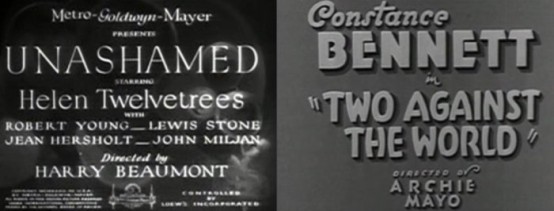

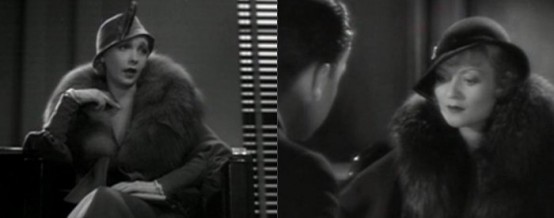
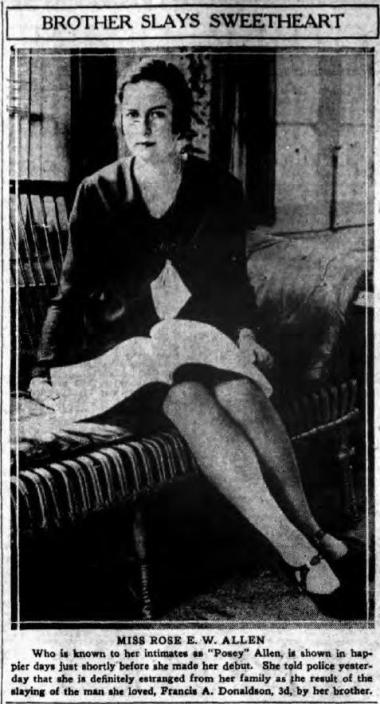




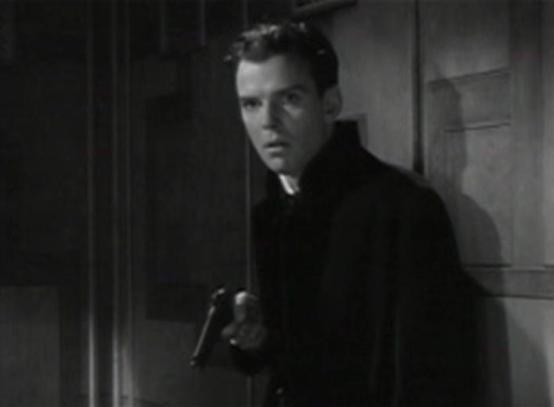

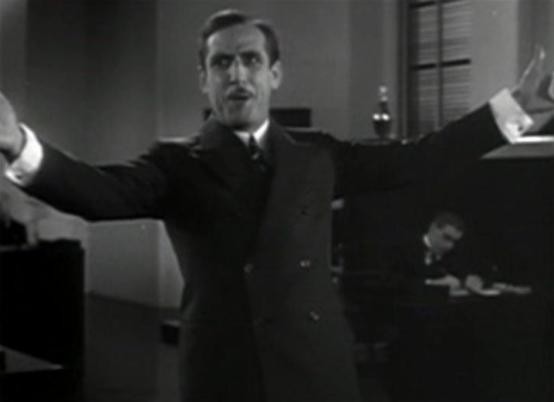
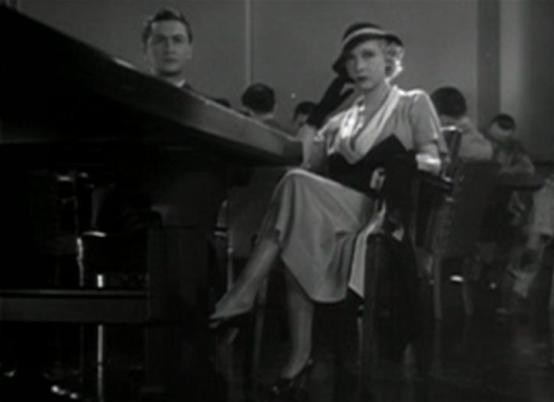

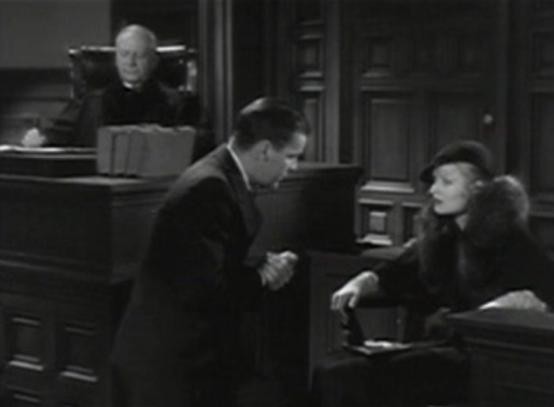
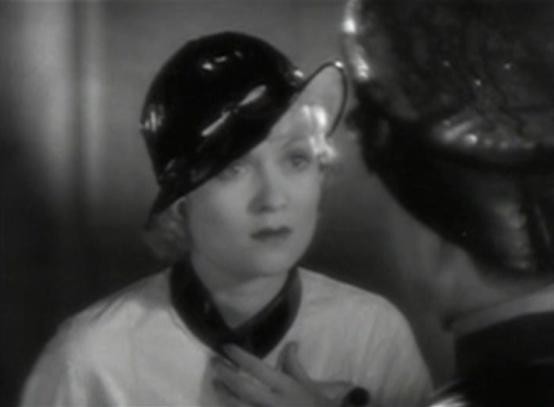




Fantastic post, thanks so much.
Glad you liked, Lesley, and thanks for the share on Facebook!
What a fascinating case – I can imagine why newspaper readers would be riveted. But so sad, too. That poor family!
Thanks for posting this and showing us how these two movies relate to each other, and to this high-profile murder.
After I saw a note in an old review vaguely tying Unashamed to something in the headlines, I just had to keep digging. It was fascinating to research, so I’m very glad I did!
Wowza! Some people look for trouble and for others, it just comes with luggage and stays. Fascinating stuff. I’ll be keeping my eyes open for those movies.
Their luck really changed after the Crash. The daughter at the center of it all looks like she’d gotten herself back on track and then a fluke reaction to her medicines kills her. Glad they didn’t make that movie, what a bummer!